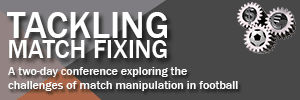By Andrew Warshaw
March 8 – One of the most significant summits dedicated solely to matchfixing in football painted a grim picture today of the extent of the issue as key speakers outlined how judiciary and integrity bodies are battling to deal with what has become a global epidemic.
The two-day Tackling Matchfixing conference organised by Rex Sport and Insideworldfootball pulled in a number of specialists – from FIFA to the Court of Arbitration for Sport – to provide a sobering assessment of the problem and the steps being taken to try and weed out the rogues responsible for arguably the sport’s most serious crisis.
William Sternheimer, CAS deputy general secretary, revealed that of the 28 cases of matchfixing dealt with by the Lausanne-based body, 19 were football-related whether involving players, coaches, officials and referees.
In some countries, it was pointed out by an earlier speaker, Liverpool University expert Prof David Forrest, clubs themselves were in criminal hands and were being used “explicitly” for matchfixing purposes.
With betting companies spending more and more money on television advertising, there are growing concerns that promotional betting is encouraging matchfixing. Simon Barker, assistant chief executive of England’s Professional Footballers’ Association with special responsibility for betting, declined to subscribe to that theory but acknowledged that “virtually every match” shown on television, in the UK at least, was “inundated with betting adverts.”
Barker said the biggest potential danger of this was betting addiction rather than matchfixing but agreed with a number of other speakers that football’s lower leagues were now the most vulnerable area of the game.
Oscar Brodkin of international betting monitoring experts Sportradar explained why this was. “There is almost no matchfixing in the top tier of [football],” said Brodkin. “It’s basically decreased to zero. The federations are doing such a good job of stamping it out in the top tier that it has had to move to the lower tiers which are less policed.
“That’s what we’re seeing and it’s being pushed out to other sports, everywhere. Every sport being offered for betting is being spoiled with matchfixing from people who can’t fix games in the top leagues.
“This seems to be increasing because of the hole left by the decrease in matchfixing in the top tier. There’s no outlet for organised crime to make money from the top tier so they go elsewhere: it makes sense.”
With Asia housing of most of the gambling dens and illegal betting syndicates, as well as providing its fair share of matchfixing scandals, Benoit Pasquier, director of legal affairs for the Asian Football Confederation, said his confederation was stepping up efforts to “try and eradicate this cancer”.
Such is the extent of the problem in this huge and diverse Continent that Pasquier revealed one south-east Asian federation, which he declined to identify, had a serious match-fixing case even at under-16 level. Yet there are pluses in the region, too. In Nepal, for instance, proven matchfixing is now sanctioned with a three-year jail term plus a large fine.
Arguably the most pro-active major footballing nation in Europe when it comes to match manipulation is Spain. That may seem unlikely given the number of much-publicised prosecutions but Alfredo Lorenzo , integrity and security director of La Liga, said that without extensive monitoring of betting patterns and close co-operation between footballing authorities and the law, few cases would ever hit the headlines.
“We are not an organisation that simply likes to talk, we like to take action,” Lorenzo told his audience. “Is matchfixing a curse in Spain or the same as on other countries? I think the latter. The difference is that we pay attention to what is happening, not just at top-tier level but further down. In the last year we have reported more than 20 cases, 80/90 percent of which were linked to one organisation. This is to show the people of Spain and international society that we mean business.
Contact the writer of this story at andrew,moc.l1743767082labto1743767082ofdlr1743767082owedi1743767082sni@w1743767082ahsra1743767082w1743767082
